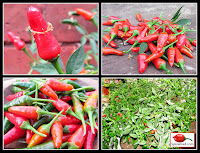Bird Peppers
The name 'Bird Pepper' is commonly associated with small-fruited wild or semi-wild chilli varieties belonging to either the C. annuum or C. frutescens species. Chilli plants belonging to these two species can be found growing wild throughout parts of Africa, Asia and the Americas, the Americas being the original ancestral home land of all Capsicum species. The birds certainly know their stuff when it comes to chillies!
Also known as 'Bird Eye Pepper' and 'Bird's Eye Pepper', many chilli varieties contain the word 'Bird or Bird's Eye' in their name. Although typically synonymous with varieties belonging to either the Capsicum annuum or Capsicum frutescens species, the name 'Bird Pepper' can sometimes be use to refer to varieties belonging to other Capsicum species too, such as Capsicum praetermissum, a semi-domesticated species from South America which can also be found growing wild. One reason why commercially grown C. praetermissum chillies are harvested at the unripe stage is because when fully ripe the birds swoop down over the plantations and eat the ripe fruit. Although it's generally believed that chilli peppers were spread to other continents by the Spanish and the Portuguese during the days of colonisation, it's also very possible that chilli peppers had already been spread to other continents by migrating birds prior to that time. Birds are the original chilli-heads!
The association between chilli peppers and birds exists because in some parts of the world it's very common to find chilli plants growing under the nests and roosts of birds, such as with wild Chiltepin plants growing under the cover of nurse plants. Aside from being used as food by humans, wild chillies are also a staple food for frugivorous birds, which are the primary dispersal vectors for chilli pepper seeds in the wild. Unlike mammals, birds are impervious to the effects of capsaicin, the chemical in chillies which makes them spicy, and the small, ripe, brightly coloured fruits are very attractive to them and can fit into their beaks very easily. A trait of all wild Capsicum species is that when fully ripe the fruit falls away from the calyx very easily (deciduous), making them a quick, tasty and very safe meal for birds. Once inside the stomach of the bird, the fruit is then digested and the seeds are exposed to enzymes, which aids with the germination process. Our feathered friends then carry the seeds far and wide before eventually expelling them from their bodies wrapped in faeces — one of Mother Nature's perfect fertilisers. When growing wild varieties, some chilli growers like to soak the seeds overnight in a slurry of bird faeces and water because they believe it speeds up the germination process.
Also known as 'Bird Eye Pepper' and 'Bird's Eye Pepper', many chilli varieties contain the word 'Bird or Bird's Eye' in their name. Although typically synonymous with varieties belonging to either the Capsicum annuum or Capsicum frutescens species, the name 'Bird Pepper' can sometimes be use to refer to varieties belonging to other Capsicum species too, such as Capsicum praetermissum, a semi-domesticated species from South America which can also be found growing wild. One reason why commercially grown C. praetermissum chillies are harvested at the unripe stage is because when fully ripe the birds swoop down over the plantations and eat the ripe fruit. Although it's generally believed that chilli peppers were spread to other continents by the Spanish and the Portuguese during the days of colonisation, it's also very possible that chilli peppers had already been spread to other continents by migrating birds prior to that time. Birds are the original chilli-heads!
Why Is There an Association between Chilli Peppers and Birds?
The association between chilli peppers and birds exists because in some parts of the world it's very common to find chilli plants growing under the nests and roosts of birds, such as with wild Chiltepin plants growing under the cover of nurse plants. Aside from being used as food by humans, wild chillies are also a staple food for frugivorous birds, which are the primary dispersal vectors for chilli pepper seeds in the wild. Unlike mammals, birds are impervious to the effects of capsaicin, the chemical in chillies which makes them spicy, and the small, ripe, brightly coloured fruits are very attractive to them and can fit into their beaks very easily. A trait of all wild Capsicum species is that when fully ripe the fruit falls away from the calyx very easily (deciduous), making them a quick, tasty and very safe meal for birds. Once inside the stomach of the bird, the fruit is then digested and the seeds are exposed to enzymes, which aids with the germination process. Our feathered friends then carry the seeds far and wide before eventually expelling them from their bodies wrapped in faeces — one of Mother Nature's perfect fertilisers. When growing wild varieties, some chilli growers like to soak the seeds overnight in a slurry of bird faeces and water because they believe it speeds up the germination process.

